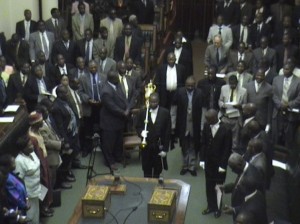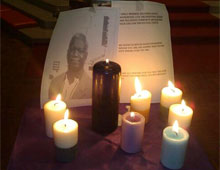HOT SEAT INTERVIEW: Violet Gonda speaks to Professor Brian Raftopoulos and Brian Kagoro
VIOLET GONDA: My guests on the programme Hot Seat are political commentators Professor Brian Raftopoulos and Brian Kagoro, with their analysis of the outcome of the SADC Troika Summit on Zimbabwe – which urged the political parties to engage in a dialogue to find a lasting solution to the outstanding issues in the implementation of the Global Political Agreement. Morgan Tsvangirai said he was rejoining the unity government and that Robert Mugabe had been given 30 days to comply with the ‘pertinent’ issues they had agreed to, but which had not been implemented. Let me start with Prof Raftopoulos. Are you surprised with the outcome of the SADC TROIKA Summit?
BRIAN RAFTOPOLOS: Not at all. I think it was predictable that they would take this course, which is to continue to engage and continue to ensure that the various parties stay in the Agreement. It was always likely they weren’t going to take any stronger position given that the issues that are there have been known for the past year and that the position would be that they would just want the national players to continue to engage – but of course with greater urgency given that these problems have been there for some time and that they need a very serious resolution.
GONDA: So does this actually resolve the crisis for the benefit of the nation or does it just defer the crisis for another 30 days? (Read more…)
Fri, November 6 2009 » Interviews » Leave a comment

Report Cover photo: Zanu PF in Parliament as a minority for the first time in 28 years
The Global Political Agreement signed on 15th September 2008 was an uneasy compromise between the two MDCs and Zanu PF, and was the result of a combination of factors: the weakening of both Zanu PF and the opposition, together with the social and civic forces that supported the MDCs; the disastrous economic and humanitarian descent in the country; pressure from SADC; and growing international isolation of the Mugabe regime. Moreover while for Zanu PF the GPA was a modality to claw its way out of the economic crisis and to begin a normalistion of international relations, the MDCs accepted the agreement as their only viable route to power, and a vital opportunity to begin a process of national political and economic revival. (Read more…)
Tue, June 30 2009 » Access to resources, Global Political Agreement, Human rights, Reports » Leave a comment

Report Cover Photo: Zimbabweans in Bulawayo board the “Omalayitsha” to Johannesburg, June 2009
There is not much likelihood that the formal economy in Zimbabwe will recover any time soon. It is likely to take over a decade before industry begins to recover in any meaningful way, and in the interim, Zimbabwe will continue to lose her youth to the diaspora, and those left behind will struggle to survive. Particularly in rural areas, grinding poverty is likely to be a factor for the indefinite future.
Diasporisation is escalating exponentially, with our sample families reporting a one hundred fold increase in the rate at which family members are leaving, between 1990 and 2009. However, there is not proving to be a corresponding return in remittances for rural families in Matabeleland. (Read more…)
Tue, June 30 2009 » Access to resources, Diaspora, Reports » Leave a comment
HOT SEAT INTERVIEW: Journalist Violet Gonda speaks to political analysts Prof Brian Raftopoulos and Dr Alex Magaisa reflecting on Prime Minister Morgan Tsvangirai’s first 100 days in Zimbabwe’s power sharing government.
VIOLET GONDA: On 11 February Morgan Tsvangirai was sworn in as the country’s Prime Minister marking the beginning of an extraordinary new government which brought bitter enemies together in an uneasy coalition. The Prime Minister and his MDC would have been in government for 100 days on the 11th of May. This week on the Hot Seat programme political analysts Professor Brian Raftopoulos and Dr Alex Magaisa give us an analysis on the last 100 days.
Let me start with Alex, the PM said on the day of his inauguration and I quote: ‘For too long, our people’s hopes for a bright and prosperous future have been betrayed. Instead of hope, their days have been filled with starvation, disease and fear. A culture of entitlement and impunity has brought our nation to the brink of a dark abyss. This must end today.’ Now Alex, 100 days down the line, what changes have you seen since this statement was made?
ALEX MAGAISA: Well Violet, first of all you have to say that 100 days is always a figure that you pick out because it’s just 100 days, it’s very difficult to judge whether or not there is anything tangible that has taken place within that period. What I have to say is that whatever we discuss in relation to this 100 days we have to appreciate that it has been tainted very much so by the tragedies that has affected the Prime Minister Mr Tsvangirai. (Read more…)
Fri, May 8 2009 » Interviews » Leave a comment
In Zimbabwe in 2008, the March Presidential election failed to produce an outright winner, although Morgan Tsvangirai won 47% of the vote to Robert Mugabe’s 43%. The ensuing state orchestrated violence reduced the June run off to an illegitimate one-man race, as Morgan Tsvangirai withdrew, citing impossible conditions for his supporters. Since then, there has been a running debate both in Zimbabwe and abroad on whether the MDC should enter into a transitional government of unity with ZANU PF, as a way of temporarily resolving the crisis of governance. On September 11th 2008, such a transitional government was agreed to – and then disputes about the modalities of operation delayed implementation until Feb 2009.
Those with reservations about the Global Political Agreement (GPA) frequently refer to the Unity Accord (UA) of 1987, in which the opposition party ZAPU was swallowed up by ZANU PF, as providing a salutary lesson to those who attempt to govern side by side with ZANU PF. While the current GPA presents a major challenge to all players, and could well fail to thrive in the months to come, the circumstances leading to the GPA and the UA have been markedly different, as have the nature and content of the agreements themselves. Furthermore, Zimbabwe’s world context has significantly changed in the last twenty years, meaning that crude parallels between the UA and the GPA may be neither particularly useful nor instructive. (Read more…)
Sun, February 15 2009 » Essays, Global Political Agreement, History » Leave a comment















